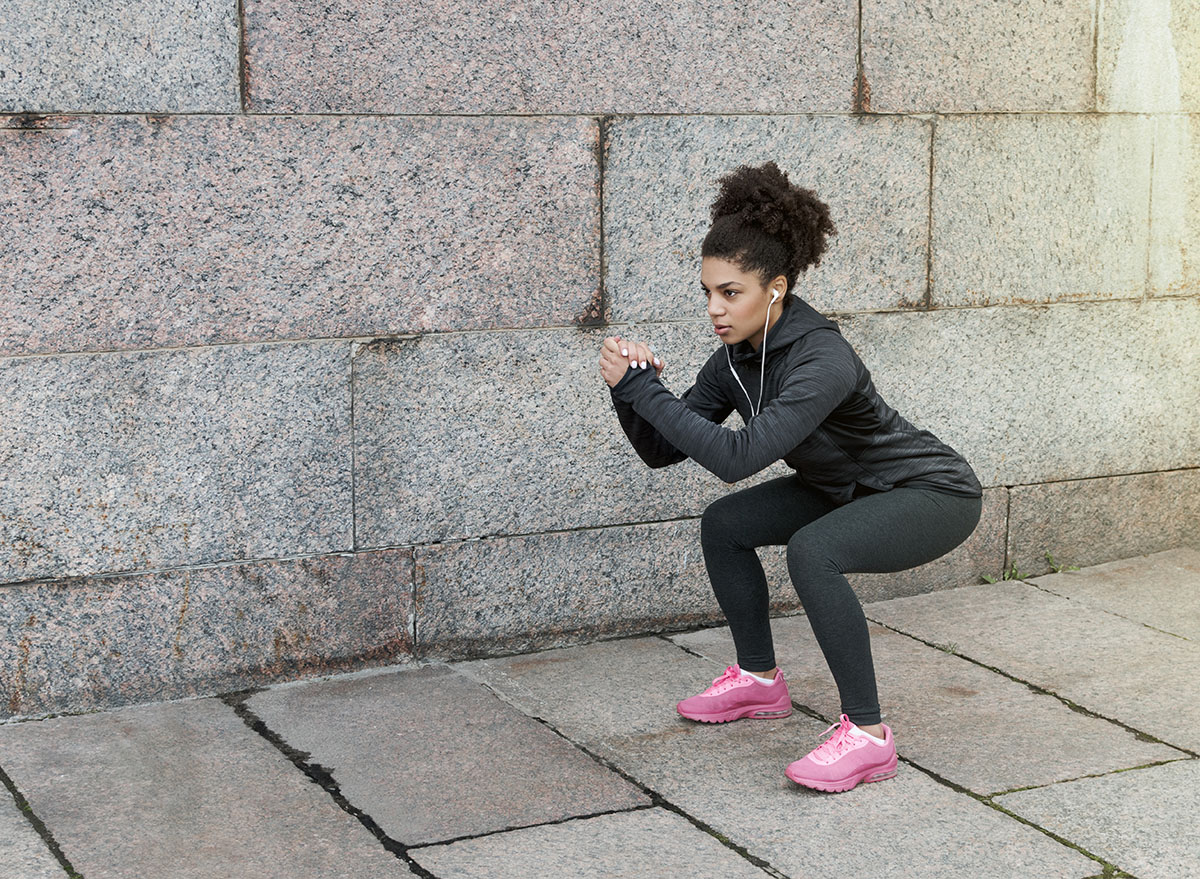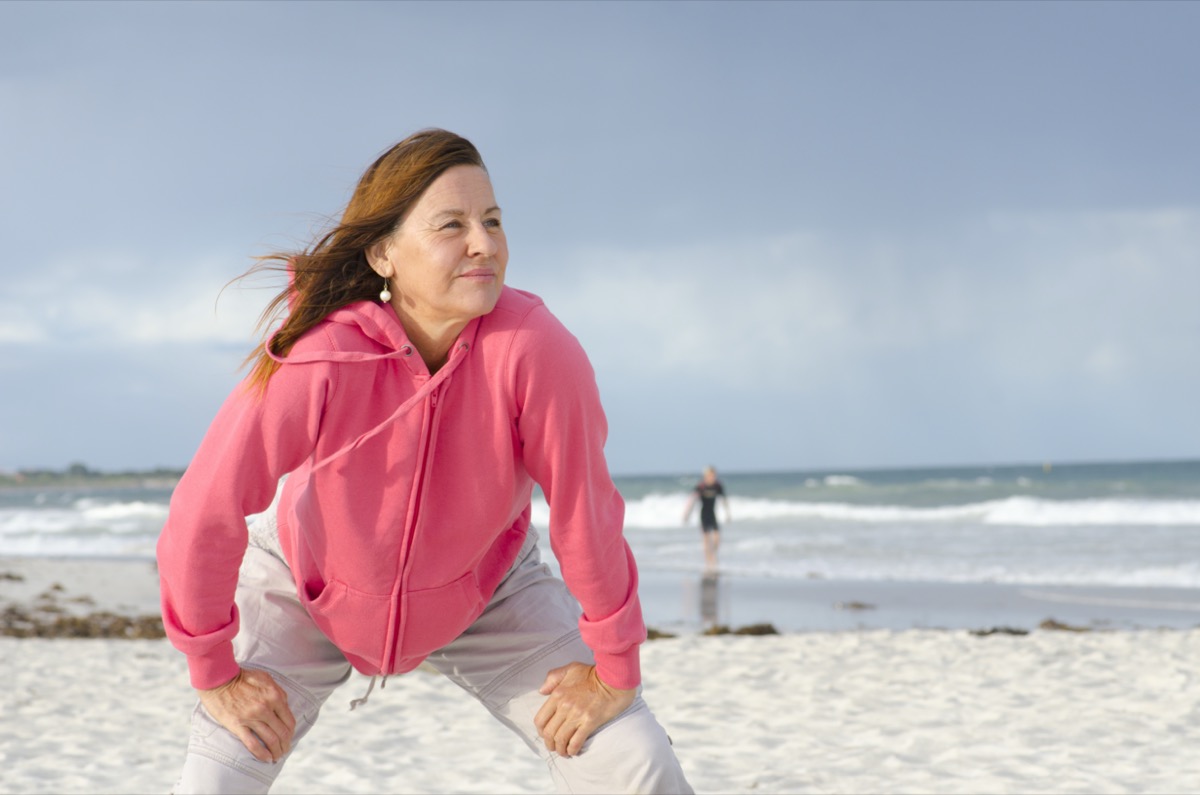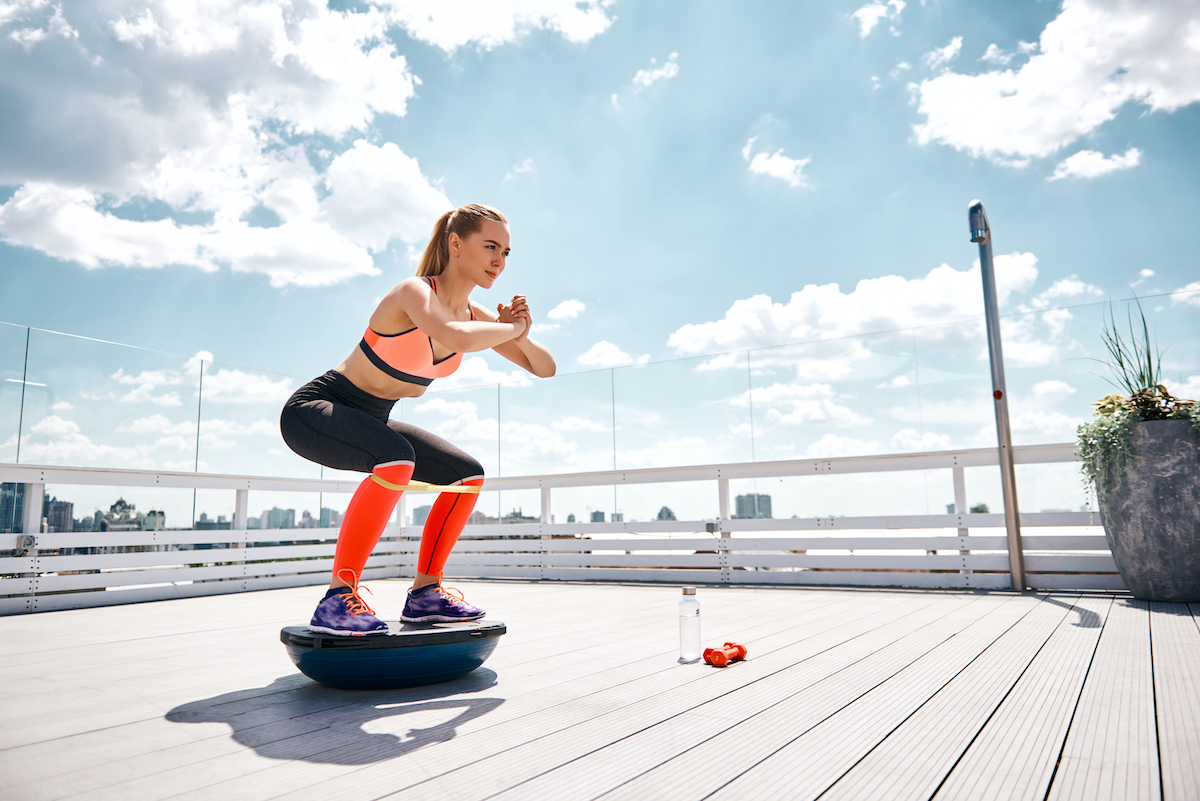This Is What Doing Squats Does to Your Body, According to Science

On average, the typical American adult spends roughly six-and-a-half hours each and every day sitting down. Obviously, this isn't good. According to the World Health Organization, leading a sedentary life doubles one's risk of developing heart disease. What's more, lounging more and exercising less is perhaps the shortest and surest path to weight gain, enduring back and shoulder pain, and—per recent research published in the Journal of Sports Sciences—poor mental health that could spiral into depression.
But if there is a perfect exercise antidote to sitting, there's a case to be made that it's squatting.
One fascinating study from last year, conducted by the University of Southern California and published in the Proceedings of the National Academy of Sciences, found that a tribe of hunter-gatherers living in Tanzania rest for long periods each day (9-10 hours) yet show little to no signs of the chronic diseases linked to sedentary behavior that are so prevalent in the West. What are they doing differently? Instead of sitting all day the tribe members squat or kneel for hours on end.
Furthermore, researchers of the world's oldest living people have observed that they have a habit for sitting on the floor, which results in more squats every day. "The longest-lived women in the history of the world lived in Okinawa, and I know from personal experience that they sat on the floor," Dan Buettner, a researcher and journalist, recently explained to Well+Good. "I spent two days with a 103-year-old woman and saw her get up and down from the floor 30 or 40 times, so that's like 30 or 40 squats done daily."
If you're still not sold on the benefits of squatting more every day, read on, because here we explain everything that happens to your body when you make squatting a regular thing. And for more great exercise advice, don't miss The Secret Exercise Trick for Flatter Abs After 40.
They strengthen your core and help your posture

Squats may make you think of your glutes, but a solid squatting regimen works more than just the derrière. Squats also work and tone abs, obliques, the muscles surrounding the spine, and the transverse abdominis (deep core muscles). Research published in The Journal of Human Kinetics reports squats activate the erector spinae (spine muscles) four times more than planks. Those muscles also play a big role in standing upright, so squats can also help improve posture. Aside from parts of your upper body, the squat essentially strengthens every single muscle you need to fight gravity. For more great exercises you can do, see these 5-Minute Exercises for a Flatter Stomach Fast.
They help you fight dementia

The positive impact of exercise on the brain is well documented. Recent research shows just a quick, half-hour walk promotes improved blood flow to the brain and better memory skills among older adults. Interestingly, squats are especially effective at preventing cognitive decline, according to top experts.
Damian M. Bailey, Ph.D., a professor of physiology and biochemistry at the UK's University of South Wales' Neurovascular Research Unit and an advisor to the European Space Agency, recently appeared on the BBC Radio 4 podcast "Just One Thing." On the air, he said squats are a must for anyone concerned about their brain health.
"Squats intermittently challenge the brain with an increase of blood flow and a decrease of blood flow," he explained. "What we have identified is that three to five minutes of squat stands three times a week is even more effective in terms of how the brain is adapting and responding to that exercise than steady-state exercise." For more on this, check out The One Exercise That's Best for Beating Back Alzheimer's.
They make you way more athletic

Some people are natural-born athletes, while the rest of us have to put in much more work to see the same athletic results. A regular squatting routine may not turn you into Michael Jordan, but it can help improve explosive strength, speed, and overall athletic performance. A study published in the Journal of Sports Science & Medicine found a jump squat routine for just eight weeks helped improve a group of athletes' sprint times, explosive strength, and other "athletic performance tasks."
They increase your bone density

We've established that squatting is great for a number of muscle groups, but what about your bones? Sure enough, squatting can also help support strong bones and greater bone density, especially in old age.
In one research project, a group of post-menopausal women dealing with osteoporosis followed a squatting routine for 12 weeks. By the end of the regimen, bone density in their necks and spines had increased by 2.9% and 4.9% respectively.
"People may be physically active, and many times people know they need to exercise to prevent obesity, heart disease or diabetes," says Pamela Hinton, Ph.D., associate professor in the Department of Nutrition and Exercise Physiology at The University of Missouri-Columbia. "However, you also really need to do specific exercises to protect your bone health." Dr. Hinton co-authored another study that concluded that weight-bearing exercises like squats promote bone formation among men.
And to learn how to do a proper squat, simply reference The Secret Trick That Makes Every Exercise Better, Says Top Trainer.
They do wonders for your brain

When it comes to the mind, squats are the gift that just keeps giving. Research published in Frontiers in Neuroscience reports that squats—and leg exercises, in general—are essential to proper brain and nervous system functioning.
When we think about muscles, we tend to think of biceps or pecs, but the body's biggest muscles reside within the legs. So, weight-bearing leg exercises send signals to the brain to create more and more new nerve cells, which help us learn, deal with stress, and adapt.
"It is no accident that we are meant to be active: to walk, run, crouch to sit, and use our leg muscles to lift things," says study co-author Dr. Raffaella Adami from the Università degli Studi di Milano, Italy. "Neurological health is not a one-way street with the brain telling the muscles 'lift,' 'walk,' and so on." And for more exercise news you can use, see here for The One Walking Exercise That Can Predict Your Death Risk, Says Study.








